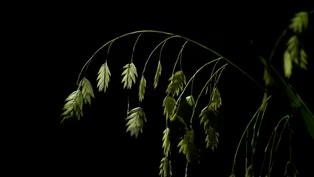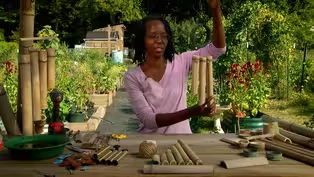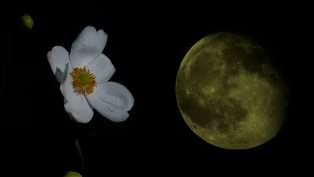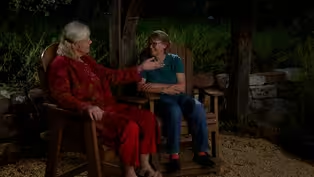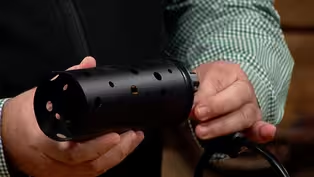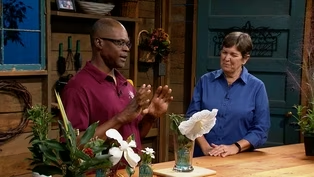Virginia Home Grown
Night Pollination in the Vegetable Garden
Clip: Season 25 Episode 7 | 2m 43sVideo has Closed Captions
Pollination occurs around the clock in our gardens
Amyrose Foll explains that many plants in the vegetable garden including squash, gourds and nightshades benefit from nighttime pollination by moths and other insects. Featured on VHG episode 2507, September 2025.
Problems playing video? | Closed Captioning Feedback
Problems playing video? | Closed Captioning Feedback
Virginia Home Grown is a local public television program presented by VPM
Virginia Home Grown
Night Pollination in the Vegetable Garden
Clip: Season 25 Episode 7 | 2m 43sVideo has Closed Captions
Amyrose Foll explains that many plants in the vegetable garden including squash, gourds and nightshades benefit from nighttime pollination by moths and other insects. Featured on VHG episode 2507, September 2025.
Problems playing video? | Closed Captioning Feedback
How to Watch Virginia Home Grown
Virginia Home Grown is available to stream on pbs.org and the free PBS App, available on iPhone, Apple TV, Android TV, Android smartphones, Amazon Fire TV, Amazon Fire Tablet, Roku, Samsung Smart TV, and Vizio.
Providing Support for PBS.org
Learn Moreabout PBS online sponsorship(mellow music) >>When we think about pollinators, you probably think about the ones that come out during the day, such as butterflies and bees.
We see them everywhere.
They are ubiquitous in conversations about pollination in your garden and in the wider world, but there are a lot of really important nighttime pollinators that are vital to the health, wellbeing, and even production of our gardens.
Here I am standing in a gourd and squash arch that I made out of some old cattle panels.
And around me you'll see little birdhouse gourds, there's a large one here, some warty gourds, spinner gourds, and Choctaw squash here.
And these are gonna be long season varieties, so you wanna plant them in the spring.
And what I have here is basically maximizing the square footage that these leaves are going to get from the sun, which is also very important.
The leaves are the solar panels of their plants.
They're going to be converting that UV energy, the sunlight into the fruits that are coming off of these vines.
And these guys have very large light colored flowers that open in the evening, and they will attract those moths, such as the hawk moth and the sphinx moth.
Sphinx moth will actually lay their eggs on the Virginia Creeper and the grapes.
Their caterpillars will eat them and develop into those moths that will help our garden.
So if you wanna plant some grapes, that's a good way to get them around here.
These aren't the only plants however that will benefit from nighttime pollinators.
There are other plants such as okra flowers.
Okra flowers are actually my favorite flower in the garden, more than hollyhocks or roses any day, hands down.
They're beautiful and they're delicious.
So you can benefit from your okra harvest with those nighttime pollinators.
Eggplants benefit greatly, as well as asparagus, beans and peas, those legumes.
And we have quite a few different kinds of nightshades, such as potatoes, tomatoes, and of course the tomatillos.
The tomatillos not being self fertile, they benefit the most out of the nightshade family.
But these moths will visit almost all of your nightshades in your garden, hopping about and doing their duty.
So when you're planning your garden or maintenance in your garden, just remember, there is pollination happening around the clock.
So we wanna make sure we're taking care of our little relatives that are helping us put all of these amazing things in our house and on our table, and make sure that we're not doing anything that could possibly hurt them.
I hope this helps and happy gardening.
Clippings: The Nighttime Garden
Video has Closed Captions
Clip: S25 Ep7 | 26m 46s | Explore the garden after dark! (26m 46s)
Video has Closed Captions
Clip: S25 Ep7 | 3m 35s | Calming sounds benefit your garden day or night (3m 35s)
Video has Closed Captions
Clip: S25 Ep7 | 8m 8s | Learn why a day and night cycle is just as important to plants as it is to us (8m 8s)
Video has Closed Captions
Clip: S25 Ep7 | 7m 36s | Visit a garden full of native plants designed to be enjoyed at night (7m 36s)
Responsible Landscape Lighting
Video has Closed Captions
Clip: S25 Ep7 | 6m 18s | Learn how to reduce glare and enhance your garden lighting design (6m 18s)
Traditional Moon Garden Plants
Video has Closed Captions
Clip: S25 Ep7 | 6m 23s | Discover the characteristics of plants for night time gardens (6m 23s)
Providing Support for PBS.org
Learn Moreabout PBS online sponsorship

- Home and How To

Hit the road in a classic car for a tour through Great Britain with two antiques experts.












Support for PBS provided by:
Virginia Home Grown is a local public television program presented by VPM
